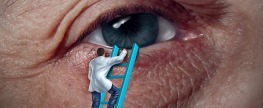
Vision loss has become a major health issue for seniors. 30% of Americans, age 65 and older suffer from vision problems that can’t be corrected with contact lenses or glasses. The American Foundation for the Blind reports the prediction is that this number will double by the year 2030. Losing your vision can severely impact the quality of your life. Aside from hindering basic activities such as reading or watching TV, losing your vision can impact your mobility and freedom. Visually impaired seniors are also at a much higher risk for falls and fractures. Many seniors may experience depression as a result of their vision problems, and the resulting limitations in their lives. Age-related vision problems are usually caused by one of these four major conditions: cataracts, diabetic retinopathy, macular degeneration and glaucoma. Cataracts Cataracts occur when too much protein builds up in your eye lens, resulting in a clouding of your vision. Over half of all Americans age 65 and older have cataracts, and it is the number one cause of blindness worldwide. Some of its symptoms include: vision that seems cloudy, blurry or foggy, double vision, perceiving colors differently and problems with glare and halos around lights. In the United States, cataract surgery, which is readily available and effective, has reduced the blinding effect of cataracts. It is usually recommended to those who have cataracts that impact their everyday activities. You can also take preventative measures in order to lower your chances of getting cataracts. A study reported by the National Center of Biotechnology Information showed that those eating a diet rich in antioxidant vitamins, such as vitamins A, C and E, had a smaller risk of developing cataracts. Diabetic Retinopathy Diabetic Retinopathy causes the blood vessels...


